Exploring Tokyo at Technos International Week Three Ways
Cover photo by Naisola Sarfo-Mensah
Cultural exchange and connection are at the heart of the experience of Technos International Week (TIW). Each year in Tokyo, Japan, students from Technos College host students from eleven sister schools for two weeks of programming. Dozens of Trinity students and faculty over the years have had the chance to travel to Tokyo for TIW with all essential expenses paid thanks to the support of Technos College and the Tanaka Memorial Foundation. For the June 8-21, 2025 trip, Trinity students Naisola Sarfo-Mensah and Simal Rashid were accompanied by Professor Kifah Hanna. In a special confluence, Ugnė Tumonytė ’24 was one of the organizers of TIW. After participating in TIW in 2023, Ugnė applied for a teaching assistant position at Technos College, was selected for the position, and has spent the past year working in Tokyo.
In this blog, Ugnė, Simal, and Naisola reflect on their experience at Technos from three different lenses. Ugnė reflects on her time at TIW and as a teaching assistant at Technos College, Simal shows us through video what it is like to travel to, in, and around Tokyo, and Naisola describes in detail the experience of being a student participant at TIW.
Ugnė Tumonytė ’23
What made you interested in Technos International Week?
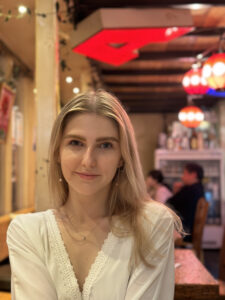
I’ve always been interested in Japanese culture and the arts. Since high school, I’ve been learning about Japanese theater, and that interest only deepened during college. At Trinity, I took a course called Tokyo Story: From Fishing Village to Cosmopolitan Metropolis with Professor Bayliss, which made me excited to see the places we studied in person. I was also curious about the differences between the Japanese and U.S. education systems, and Technos International Week seemed like a perfect opportunity to explore that.
Why did you decide to apply for a teaching assistant position at Technos?
International Week only lasts two weeks (the name can be a bit misleading!), and the schedule is very intense, so I didn’t get the chance to fully experience everything I wanted during my first visit to Japan. Since my thesis was partially inspired by Japanese avant-garde performing arts, I felt a strong urge to return and learn more directly from people working in that field. Apart from my passion for Japan, I genuinely enjoyed the environment at Technos. I made many friends and was really inspired by the school’s global spirit. Furthermore, I’m passionate about education, both teaching and learning, so this program and becoming a teaching assistant felt like an ideal fit for me.
What do you do in your role as a teaching assistant?
In the first semester, my focus was assisting native English teachers with language instruction and helping students improve their English through engaging activities and exercises. In the second semester, I started taking on the role of a teacher myself. Overall, I help organize language and cultural events and create promotional materials for them. This is one of my favorite parts of the role, as these events provide a relaxed and fun environment for students to practice English outside the classroom. For example, we’ve held Halloween parties and other seasonal celebrations. Another important part of my work is helping prepare students for study abroad programs. I conduct lessons on practical topics such as how to navigate an airport, ask for directions, introduce themselves, and make friends in an English-speaking environment. Finally, I help organize and run Technos International Week, which is both one of the most exciting and most challenging parts of my job.
What advice do you have for students interested in attending Technos International Week?
Throw yourself wholeheartedly into the experience. Be open to new foods, cultural practices, and ways of communicating. Let go of expectations – it might take patience and effort, but it will be a life-changing experience you’ll never forget. Also, learn at least a little Japanese before you go! Don’t expect everyone to speak English – it’s not their native language, after all.
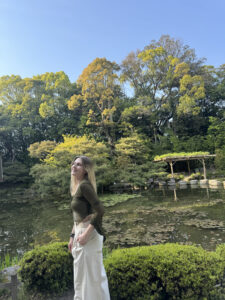
What advice do you have for non-Japanese students interested in living and working in Tokyo?
First, learn some Japanese – it’s incredibly useful. English is not widely spoken, especially outside of international settings. Second, be prepared for the pace and energy of one of the busiest cities in the world. Tokyo can feel overwhelming, with its crowds and constant movement, and it’s not the right environment for everyone. Make sure you know what you’re signing up for! Furthermore, making friends can be tough at first. Japanese people may be reserved until they get to know you, so be patient! There are so many wonderful people in Tokyo, you just have to know where to look. I recommend joining interest-based groups on social media to find like-minded people – especially when you’re just starting out. For example, I joined several theater and dance oriented groups on Facebook (yes, Facebook – I know) which allowed me to discover various workshops where I ended up making many great connections!
Simal Rashid ’27
Simal created this video documenting her time at Technos International Week with a focus on food. As a vegetarian, Simal had to get creative at times with food in Tokyo, and this video can provide some ideas to students with similar dietary restrictions traveling to the area. The video also gives a sense of the activities students experience at TIW and some of the fun things to do in Tokyo and beyond.
Naisola Sarfo-Mensah ’27
What was the day-to-day like for the two weeks you were at Technos International Week?
The structure for the day at Technos felt a lot like a typical American high school schedule. We met on the college campus each day around 9:30 a.m. and then had programming until about 4:00 p.m. The day would have two to four sessions with lunch in between, all of which were run by Technos students. These sessions gave us insight into Japanese culture and life as a student, with a good balance of fun and educational activities. We learned some Japanese phrases, had guided conversations with Technos students, and participated in a school fair! After our day ended, we had free time to explore the rest of Tokyo.
Some of my favorite activities were the scavenger hunt, the Noh theater demonstration, and the Judo demonstration! Our scavenger hunt was split into three locations across two suburbs. We were tasked with finding specific food items, signs, and locations in small groups over the course of a few hours. This activity gave us an amazing opportunity to explore the neighborhood we lived in and talk with Technos students. As we walked and bussed through the city, there was ample time to ask questions and compare our cultural experiences.
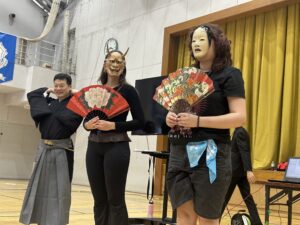
During the Noh theater demonstration, a professional Noh performer came to the college and gave us a brief history of the theater and how the props are used. He explained the meanings behind the designs and patterns found on the hand fans and robes used during performances. I loved learning about the different character archetypes and how they are expressed through costumes, masks, gestures, and posture. A week following the demonstration, we watched a real performance at a nearby theater. The background context from the demonstration helped me follow the plot a bit better!
The Judo demonstration was led by students in the Technos Judo club. They showed us a few individual moves as well as a full sparring session. We also practiced tying a Judo uniform, learned some Judo etiquette, and tried a couple moves ourselves! I’ve never done any form of martial arts before, so I really enjoyed having such a hands-on experience.
How would you describe the goals of Technos International Week?
International Week was definitely created with the goal of cultural exchange and English language practice for the Technos students. We had multiple sessions focused solely on having conversations with other Japanese students and comparing our experiences with school, food, culture, and religion. I personally did not know any Japanese before the trip, so we used lots of gestures and Google Translate to communicate sometimes! The students who were in charge of organizing were mainly from the flight attendant, hospitality, law, and global studies majors. As such, the planning and language practice was important for future careers they wanted.
What research were you working on while in Tokyo? What do you think you’ll do next with this research?
I investigated how ambiguous queer female relationships were interpreted and marketed in Tokyo compared to America. This research was largely inspired by the manga “Nana” by Ai Yazawa, which features two 20-year-old roommates, both named Nana, who navigate their new lives in Tokyo together. Both have explicit romantic relationships with men throughout the manga, but there are also many moments where the two will say or do something that suggests intimate feelings for the other. For example, one Nana has a fantasy about her roommate having an intimate relationship with another woman. The two also frequently sleep in the same bed and take baths together. Stories where a woman’s gender or sexual identity do not fit squarely into cis-heterosexual norms have always intrigued me. However, my understanding of those norms is based on American culture. So, I wanted to see if and how both the norms and interpretations differ overseas. I was able to visit some bookstores to see the cover art and genres used to label these types of stories. I also interviewed two Technos staff members who shared their understanding of Japanese norms for female relationships and how that translates into manga consumption. My plan is to reflect on the elements I find queer in stories like this and contrast them with the information I learned from observation and interviews. At the moment, I’m working on putting this into essay form, though I think this topic could be expanded into something bigger.
How will you bring what you learned back to Trinity?
The experience of being in a new country with very little knowledge of the language and culture was very humbling. I found myself observing others for the polite and correct way of doing things often. As with any new place or culture, there is only so much that one can learn from reading. As an international studies major, this trip helped me reflect on how much I don’t know about other places in the world, regardless of the studying I’ve done. It also reaffirmed the fact that learning is a continuous and endless process. As I write this, I am studying abroad in Australia, and I’ve noticed myself asking more questions and talking with more strangers about culture, nature, history, and politics. Without the experience of living with a language barrier, I might not have appreciated the value of conversation as much.
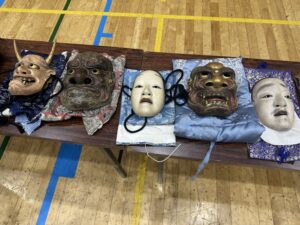
My research project also made me aware of the biases and cultural norms that influence how I consume and interpret manga and anime. I began recognizing how many historical references I was missing. For example, there are so many references to Noh theater in anime through the use of Noh masks, instruments, and singing style. Without experiencing Noh theater myself, I would probably not have paid them any mind. However, since I don’t speak Japanese, there are countless layers of nuance I still can’t understand. In cross-cultural humanities disciplines, like history, international studies, women and gender studies, etc., it is important to consider your own biases and cultural ignorance. I think this experience has helped me grasp how strongly my cultural context impacts all parts of my life. As such, humility, curiosity, and conversation are valuable skills I will carry into my studies and the rest of life.
What surprised you about the program?
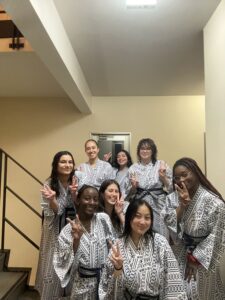
I did not expect the program to be run by students. Before arriving, I assumed International Week would run like an academic conference in the United States, with many serious and intense modules throughout the day. In reality, everything was much more relaxed and priority was placed on making connections, sharing culture, and learning through experience. We also had way more free time than I expected, which made it easy to explore the city. I didn’t have too many expectations otherwise, so the experience was very positive for me! The dining hall food was also very impressive in my opinion. I definitely looked forward to lunch each day!
What did you do in your free time in Tokyo?
Each day, I tried to go to a new city, event, or location around Tokyo. I would spend about 5 hours each day exploring, typically between 4pm and 9pm. My friends and I visited the major areas in Tokyo, including Harajuku, Shinjuku, and Shimokitazawa. It was so fun getting to explore the fashion, music, and food scenes. I really liked visiting vintage and secondhand stores and having conversations with the store owners.
On one of my favorite nights, I went to a small music venue where local rock and metal bands performed. I mostly listen to American and European metal, so it was cool hearing the differences and similarities between the styles. The venue itself had really cool art and posters everywhere. Everybody in the crowd had a lot of energy and dressed in cool, unique outfits too. The performances were really great, even though I didn’t understand the lyrics!
Our schedule also allowed us two free days, so some friends and I visited Kyoto on one of them. After spending so much time in Tokyo’s fast-paced, densely populated city, Kyoto’s historical and natural beauty was a nice change. We took a bullet train early in the morning and spent the day visiting public parks and old temples. The Golden Pavilion was especially beautiful. The main temple is on a hill in the middle of a lake and surrounded by forest, so the whole area looked beautiful. The contrast between the brilliant golden architecture, the vibrant green trees, and the bright blue skies looked magical! If I get a chance to return to Japan, I’d love to spend more time in Kyoto.
